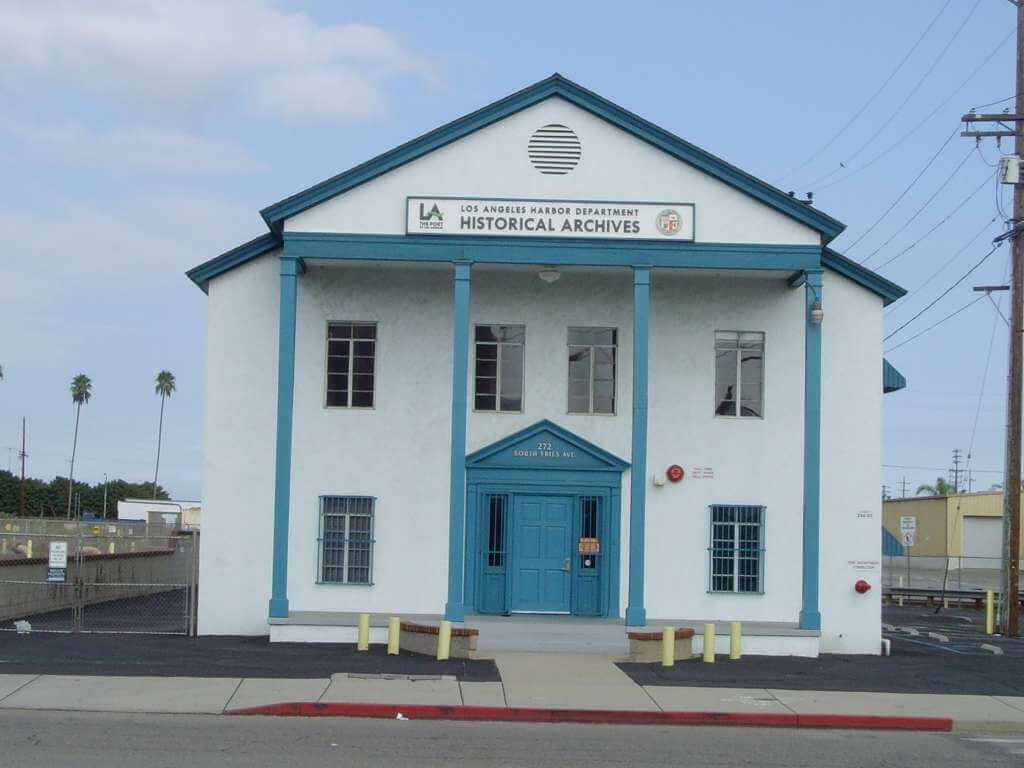Port of Los Angeles Archives In Danger
The Port of Los Angeles Archives Need Your Help
Port of Los Angeles Archives Building, 2010-15
In early 2015, the Port of Los Angeles clandestinely closed its archival facilities and ended its program to preserve and protect its historic records.
These estimated 25,000 linear feet of historic material now face:
- Lack of climate control
- Vermin infestation
- Proximity to salt water
- No one on staff qualified to properly care for these records
- No knowledge of the content of the historic resources in the Harbor Department’s possession
Warehouse One: where majority of archives have been moved
This is one of those important Southern California archives that historians and curators like myself know must be saved.
Alan Jutzi, Avery Chief Curator, Rare Books, Huntington Library

What You Should Know About The Port of Los Angeles Archives
In 2010, The Port of Los Angeles, with the full approval of the Los Angeles Harbor Commission and the Port of Los Angeles Executive Director, began a program to identify, protect and preserve its historic resources.
An estimated 25,000 linear feet of historic materials have been identified, an enormous collection practically unknown to scholars and researchers. This includes photographs (prints and negatives), operational records, accounting ledgers, maps, engineering blueprints, promotional material and assorted ephemera.
The enormous significance of this material cannot be understated. Read Nicholas Beyelia’s Open Letter below to learn more about its importance.
The archives were previously retained in the former Coast Fishing Company Offices in Wilmington. By 2010, the building had been converted to a proper archival facility. This included climate controls, security in the form of storage rooms with keyed entry and space to process oversized historic materials such as maps.
In early 2015, the Port of Los Angeles clandestinely closed its archival facilities and ended its program to preserve and protect its historic records. The historic resources were removed from the appropriate archival storage facility and placed in storage conditions that are inhospitable to any kind of records. The current facilities suffer from vermin infestation and are located directly adjacent to the water; the humidity is on any given day approximately 15-20 percent higher inside than it is outside the facility. The historic records are in immediate danger of being lost forever.

No Climate Control In Current Facility

Located On The Water

Archives Facility 2010-15

Materials Stored Improperly
Open Letter To The Community
October 22nd, 2015
Dear Community Members:
My name is Nicholas Beyelia, I am a recently graduated M.L.I.S. student who has worked at the Los Angeles Harbor Department/Port of Los Angeles Archives for the past three years. I am writing this open letter in order to inform you of a very serious crisis that will concern anyone who cares about the preservation of historic documents in Los Angeles, and also to ask that you please join me in lending your support for saving this endangered archival material by signing the petition. In 2010, The Port of Los Angeles, with the full approval of the Los Angeles Harbor Commission and the Port of Los Angeles Executive Director, began a program to identify, protect and preserve its historic resources. It opened an archival facility capable of processing and properly housing its resources (climate controls, security in the form of storage rooms with keyed entry and space to process large and/or oversized historic materials such as maps). By processing these materials, we were able to uncover important documents that had been long forgotten by both time and the Harbor Department itself.
The scope and content of these records is staggering and has profound and, often, revelatory, implications on the history of Los Angeles over the past century. The maps and blueprints alone offer a unique representation of the communities that once thrived in and around Los Angeles Harbor: the Brighton Beach resort, the East San Pedro squatters (including Charles Lummis, a figure integral to LA history) and the Japanese American community that was wrongly removed from Terminal Island during internment. Several of the maps date to the 1880s and show Dominguez family lands, land parcels owned by the Banning Family, the Lower Reservation of Fort MacArthur (before demolition) and San Pedro & Wilmington prior to commercial development. There are also alternative design plans for Los Angeles Harbor, the San Pedro Waterfront, Cabrillo Beach and Terminal Island that were changed at the last minute or never fully realized.
The LA Harbor Department archives made these historic resources openly available to researchers for the first time ever. The Executive Director hosted an open house for the community on April 11, 2013 to promote awareness of the archive and to publicize the fact  that  the  Port’s  historic  resources  were  finally being preserved and protected for posterity. This event was covered by the local newspaper, the Daily Breeze and circulated through Port of Los Angeles press releases. In early 2015, the Port of Los Angeles clandestinely closed its archival facilities and ended its program to preserve and protect its historic records. The historic resources were placed in storage conditions that are inhospitable to any kind of records. The current facilities are located directly adjacent to the water and the humidity is (on any given day) approximately 15 to 20 percent more humid than it is outside the facility. On July 20, 2015, the National Weather Service documented the humidity in San Pedro at 91%. The next few days, the humidity never fell below 84%. The facilities have a track record of leaky roofs, insect infestations and one location has a serious problem involving feral cats that enter the building through antiquated grain chutes; they have urinated on a number of records boxes. I do not have much hope that any of the historic resources will survive for long in these conditions. The Port of Los Angeles Archives remains in the online Los Angeles City Directory and stories about its opening remain online, yet the Port has closed the archive and has no plans to reinstate a preservation program or open another archival facility.
It is important to state that, as a proprietary department in the City of Los Angeles, the Port of Los Angeles does not transfer its historic records to the Los Angeles City Archives at C. Erwin Piper Technical Institute, nor does the LA City Clerk have any dominion over these records. The Port of Los Angeles is solely responsible for these records and has no qualified person on staff to manage, preserve or even advocate for these resources. These records are in peril unless we, as a community, demonstrate an active show of concern and unite to advocate for the preservation of these records. As an individual who has sworn to uphold the Society of  American  Archivists’  core  value  and  ethics,  I will personally move forward with this action by appearing before the Los Angeles Harbor Commission to ask that they reinstate an archival program under the direction of a qualified archivist or transfer the historic resources to an archival facility that can properly care for them. I ask that you show your support for the protection of these irreplaceable historical resources by signing the petition.
Sincerely, Nicholas Beyelia, M.A., M.L.I.S.
Â
Historians & Archivists Who Support The Open Letter

Jennifer A. Watts

William Deverell

Alan Jutzi

